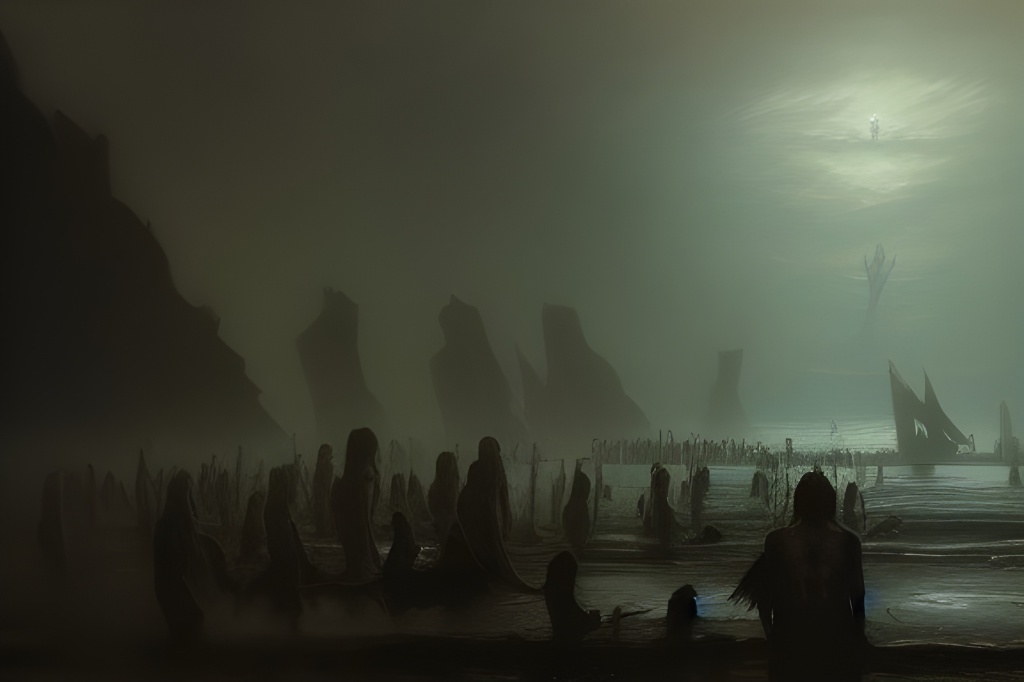From the Maori Folklore of the Cook Islands
In the Sacred Islet lived Eneene, his wife Kura, and his sister Umuei. These women were young and fair, and loved to roam the woods in quest of sweet-scented flowers, which they weaved into wreaths and necklaces. On one occasion they fortunately discovered a noble bua, whose far-spreading branches were covered with fragrant yellow blossoms. The sisters-in-law sat awhile at the foot of the tree discussion the division of the spoil. It was clear that Kura should collect on one side of the tree, and Umuei on the other. But the great central branch seemed the richest prize of all. It was eventually agreed that Kura should have this treasure.
The young women set to work in good earnest; but, after a time, it became evident that Kura was gathering more than fell to her share. To punish her, Umuei took possession of the coveted central branch. The wife of Eneene was speedily chastised for her covetousness without the intervention of Umuei; for the branch on which she was leaning heavily in order to steal some of her sister-in-law’s, suddenly broke. Kura, basket and all, fell with the branch of the sacred tree, cleaving the earth, and continued to fall until she reached Avaiki, or spirit-world. The ghosts, happening to be on the look-out, caught her in their arms, so that she was not killed by the fall. The captive Kura was hurried off to a considerable distance, and at once firmly tied up to the central post of a house. It was settled by these infernals – called “the army of Marama” – that to to-morrow Kura should be cooked and eaten. A special guard was set over her, both blind and aged, named Tiarauau. At regular intervals the old fellow would shout, “E Kura e!” (O Kura), to which the unvarying reply of the victim was, “E Tiarauau e!” (O Tiarauau). Thus was the blind wakeful guardian assured of the safety of his prisoner.
Now Umuei, witnessing the sudden fall and entire disappearance of Kura into the very bosom of the earth, ran weeping to inform Eneene. Anxious, if possible, to recover his wife, he bethought himself of his god Tumatarauua, himself manufactures out of the bua. Invoking the aid of the god, and carrying it in his arms, he went to very spot where his wife had lately disappeared; and, pronouncing the invocation to the divinity of the sacred bua tree, the earth opened and he descended to spirit-land. Eneene at once began his search for his beloved young wife, so suddenly removed from his sight. Now the name of that particular part of nether-world was Marama. As, fortunately for Eneene, it was night at the period of his entrance, his presence in the shades was unnoticed. Anxiously wandering about from place to place, he heard the loud interrogations of the old blind keeper and the replies of Kura herself. His lost wife was found; but the puzzle was how to get her away without exciting the suspicions of Tiarauau and other hungry denizens of the shades. Cautiously peering in all directions through the darkness, he discovered a cocoa-nut tree with eight cocoa-nuts on it. Eneene climbed the tree, carefully plucked a single nut: holding the stem between his teeth, he silently descended to the ground. This process was repeated again and again, until the tree was cleared, without attracting the notice of the ever-watchful Tiarauau. With extreme care during that long night Eneene succeeded in husking the nuts and scraping out their contents, too, without noise.
There were eight paths leading to the house where Kura was kept prisoner. Eneene was careful liberally to scatter the finely grated cocoa-nut over these pathways, and close to the house itself. The rats, scenting the rich food, now came by hundreds to feast themselves. They even fought and quarrelled over the delicious morels, not only on the ground but on the low-thatched roof, enough to drive a man out of his senses. Certainly it seemed strange to Tiarauau that the rats should be so unusually noisy. Amidst this turmoil, Eneene climbed the roof and cautiously removed part of the thatch to discover in what part of the house his wife was tied up. At this moment the old blind guardian called out, “O Kura!” Listening intently to the reply, he discovered that his poor trembling young wife was in the middle of the dwelling. Advancing to where the voice seemed to come from, Eneene carefully removed part of the thatch, put down his hand and touched his imprisoned wife. The astonished Kura asked in an undertone, “Who that was?” and received the joyful answer, “Your own husband Eneene.” The roof of the house was sufficiently low to permit the husband to untie the cords by which his wife was tied up to the post. He then drew her up on the roof to himself. Eneene now directed her to descend to the ground, and run off as fast as she could to the foot of the closed chasm by which she had so summarily entered Avaiki, and there to await his arrival.
Eneene now let himself down through the low roof, and occupied the place of the released prisoner, so as to give her time to escape. The old guard called out as usual, “O Kura!” to which Eneene replied, closely imitating the voice of his wife, “O Tiarauau!” The truck was not discovered, either by Tiarauau or the drowsy inmates of the prison-house. Eneene now thought it to be high time to provide for his own safety. Crawling up through the hole in the thatch, he cautiously let himself on the ground and ran as nimbly as he could to the appointed rendezvous, where he found his trembling wife waiting for him.
There was no time to be lost, for he could hear the echo of Tiarauau’s stentorian voice giving the alarm. Clasping his wife in his arms, he offered the following prayer to his god:
United in one fate,
We ascend, we rise,
To light, to light,
To clear mid-day.
At these potent words the gloomy rent again opened, and both were borne through the chasm up to this world of ours, where it was still daylight. A moment later, and the enraged army of Marama would have caught Eneene and Kura, so close were those infernal hosts upon their heels.
Source:
Myths and Songs From the South Pacific, William Wyatt Gill, 1876





